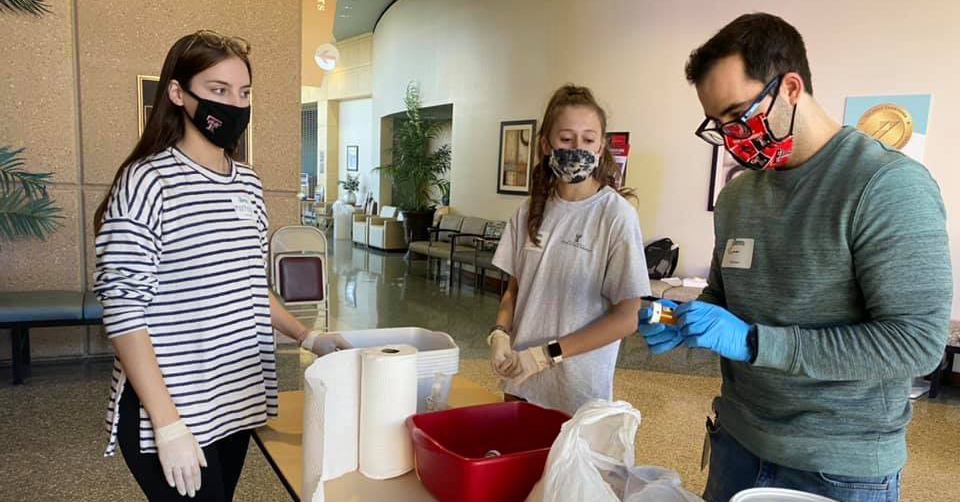TTUHSC to Host Lubbock’s Spring Medication Cleanout™

Medication Cleanout™ allows residents to dispose of their medications without leaving their cars.
To provide a safe and environmentally friendly way for people to properly dispose of expired, unwanted or unnecessary medications, the Texas Panhandle Poison Center (TPPC), managed by the Texas Tech University Health Sciences Center (TTUHSC) Jerry H. Hodge School of Pharmacy, will host Lubbock’s Spring Medication Cleanout™ event from 10 a.m. to 2 p.m. April 22 (Saturday) at the Texas Tech Physicians Medical Pavilion, 3601 Fourth St.
Medication Cleanout™ employs a drive-thru, drop-off format that allows residents to conveniently dispose of their medications without leaving their cars. The program also provides disposal services for syringes and sharps. Yard signs will be posted to help drivers locate the drive-thru path.

The event is from 10 a.m. to 2 p.m. on April 22
“Old medications become potential sources of poisoning to young children or may be accessed by teens experimenting with drugs,” TPPC Managing Director Jeanie Shawhart, Pharm.D., said. “They also pose a hazard for adults and elderly as they increase the risk of choosing the wrong bottle or taking medications that are no longer required.”
Medications should be left in their original containers. Because of environmental restrictions, only medications from households can be accepted. Medications from clinics, pharmacies and other businesses are not allowed.
“Taking a few minutes to clean out your medication could be a life-saving task because poisoning, including medication overdose, is the leading cause of unintentional injury death in the country,” Shawhart, who also is an assistant professor of pharmacy practice at the Jerry H. Hodge School of Pharmacy, stressed. “Now is the time to clean out your medicine cabinets and remove these items from your homes to reduce the risk of poisoning by medications.”
Volunteers providing support for the event include staff from TPPC, the Texas Tech University (TTU) Police Department and the Department of Community, Family and Addiction Services at the TTU College of Human Sciences. Pre-pharmacy students from TTU and students from the TTUHSC Schools of Pharmacy and Nursing also are volunteering for the event. For more information, call (806) 414-9495 or visit MedicationCleanout.com.
Related Stories
From Backpacks to White Coats: TTUHSC School of Medicine Invests in Tomorrow’s Healers Today
As part of its partnership with JAMP, the TTUHSC School of Medicine Admissions Office recently partnered with Alderson Elementary School in the Lubbock Independent School District to provide critical school supplies.
Amy Purdy Delivers Keynote Address at TTUHSC Laura W. Bush Institute for Women’s Health Power of the Purse Luncheon
American snowboarder, motivational speaker and author Amy Purdy delivered the keynote address at the Power of the Purse luncheon and fundraiser on April 10.
Texas Tech University Health Sciences Center Unveils Craddicks’ Honorary Name for Physician Assistant Studies Program
TTUHSC unveiled a new name for a decade-old program on Oct. 15. The Nadine and Tom Craddick Physician Assistant Studies Program honors Rep. Tom Craddick and his wife Nadine.
Recent Stories
National Academy of Inventors Names TTUHSC Faculty Senior Members
The National Academy of Inventors (NAI) has designated two current and one former TTUHSC faculty researchers as Senior Members.
The John Wayne Cancer Foundation Surgical Oncology Fellowship Program at Texas Tech University Health Sciences Center Announced
TTUHSC is collaborating with the John Wayne Cancer Foundation and has established the Big Cure Endowment, which supports the university’s efforts to reduce cancer incidence and increase survivability of people in rural and underserved areas.
TTUHSC Receives $1 Million Gift from Amarillo National Bank to Expand and Enhance Pediatric Care in the Panhandle
TTUHSC School of Medicine leaders accepted a $1 million philanthropic gift from Amarillo National Bank on Tuesday (Feb. 10), marking a transformational investment in pediatric care for the Texas Panhandle.
